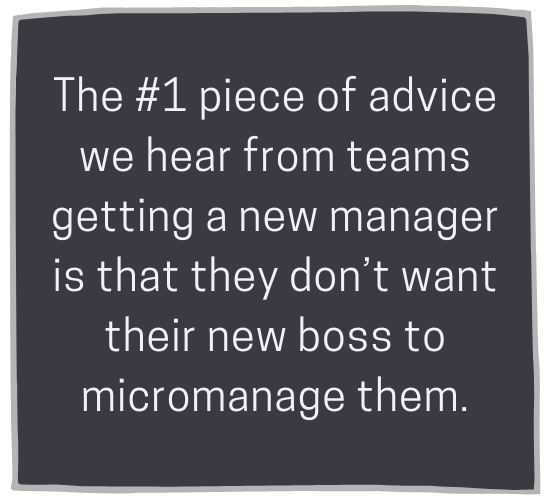Leading a team that you did not build can be complicated. The people on your team will likely be anticipating disruptive changes and fearful of the expected upheaval.
When managers inherit a team, the situation, like most new relationships, can be fragile. You will want to maintain the stability of the team as it exists and carefully work to improve while moving forward. Your first week on the job lays the groundwork for those relationships and sets the tone for future team improvements.
Survey the Team to Assess the Mood and Expectations
You absolutely want to survey the team with assurances of anonymity. This gives you a platform to check the mood of the team and to discover the priorities of the group. It provides an opportunity for each member to share their input and to be heard.
Lastly, an anonymous survey would be a tremendous help to learn what your team expects of you. It’s the start of a conversation and potentially how to set the expectations of you and of the team.

Introduce Yourself to Establish a Connection
The best signal for you to send to your new team is that they are a priority for you. One way to do this is to introduce yourself to each team member before you dive into learning your responsibilities and the demands of your new managerial role. This is a building block of trust and connection, which will work to improve participation and collaboration.
Make the effort to introduce yourself to each individual member of the team, the department, and other managers and key leaders. Some colleagues may not feel comfortable introducing themselves to you, so take the initiative for the first outreach.
Ask to Observe Meetings in Week One
Your first week on the job is to absorb the culture and learn how the organization functions. You will have opinions and suggestions but hold those back for a while until you have a full grasp of operations and relationships. There are risks if you speak up too soon. You could make suggestions that go against accepted practices of the organization, or you could unintentionally offend individuals or established relationships.
One-on-One Meetings – Your Team Members Will Feel Heard
In your first week, take the time to schedule one-on-one meetings with your team members. The meetings may not happen for a week or two, but the effort you extend by reaching out to set aside some time will be valued by your team members. They will appreciate that their input and feedback is valued.
Use these one-on-one meetings to learn more about each other. The conversations should revolve around how to best work together, such as, “What motivates you?” and “Through what methods do you communicate best? Do your prefer email, phone calls, or in-person, etc.?”
Bonus: Introverted personalities add tremendous value to a team but are often hesitant to voice their opinions in group settings. One-on-one meetings give introverts the time and space to share at their own pace.
Take a Fresh Look at Areas for Improvement
With your team, create a list of processes or issues that need a fresh look and new ideas. This gives you a glimpse into the challenges your team is currently facing and allows you to address any simmering complaints or grievances. This also gives the team a place to collectively reimagine how they can collaborate to create or revitalize team objectives. This shows your team that you value their voice and the work that is produced.
Avoid pushing your processes and expectations. There is a time and place for those changes, but the fresh look meeting is meant to discover what’s working or not working for the group and to create a foundation for a strong relationship.
Team Development with Excelerant
Taking over a team you did not build is a chance to create something new, to visualize a new way of working, a new way of doing things, together.
The professionals at Excelerant can help you to develop your team into a collaborative, effective group.
Christina Harper Olivier, PCC, PHR, CTP – Christina applies her expertise in the leadership development field to improving performance, strengthening operations and support her clients in reaching the next level of growth. She uses a “coach approach” to focus on the connections between profitability, employee engagement, retention and business results. Christina’s unique ability to quickly assess a company’s needs and chart a path for capitalizing on its investment in its people has made her a valuable partner in a variety of industries.



